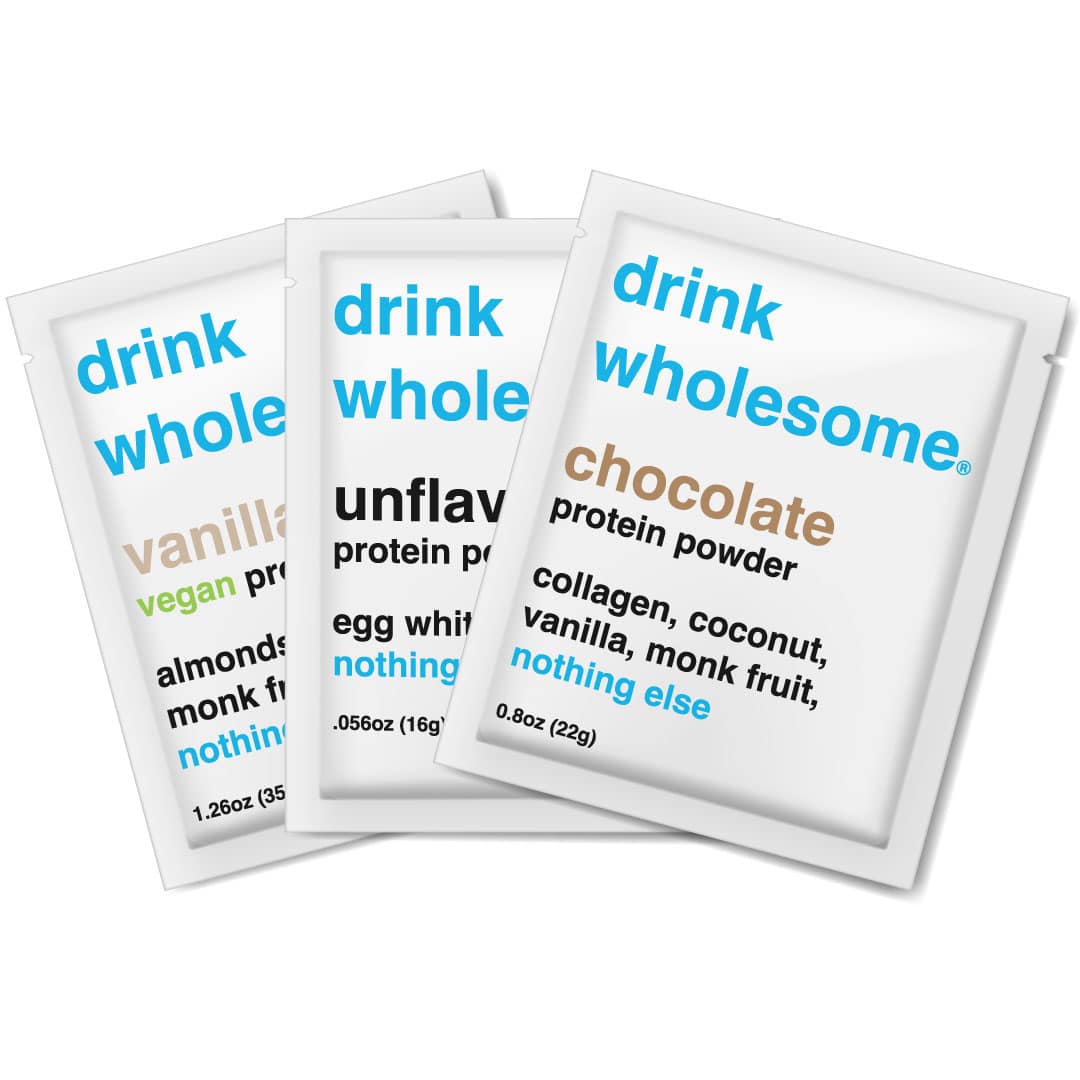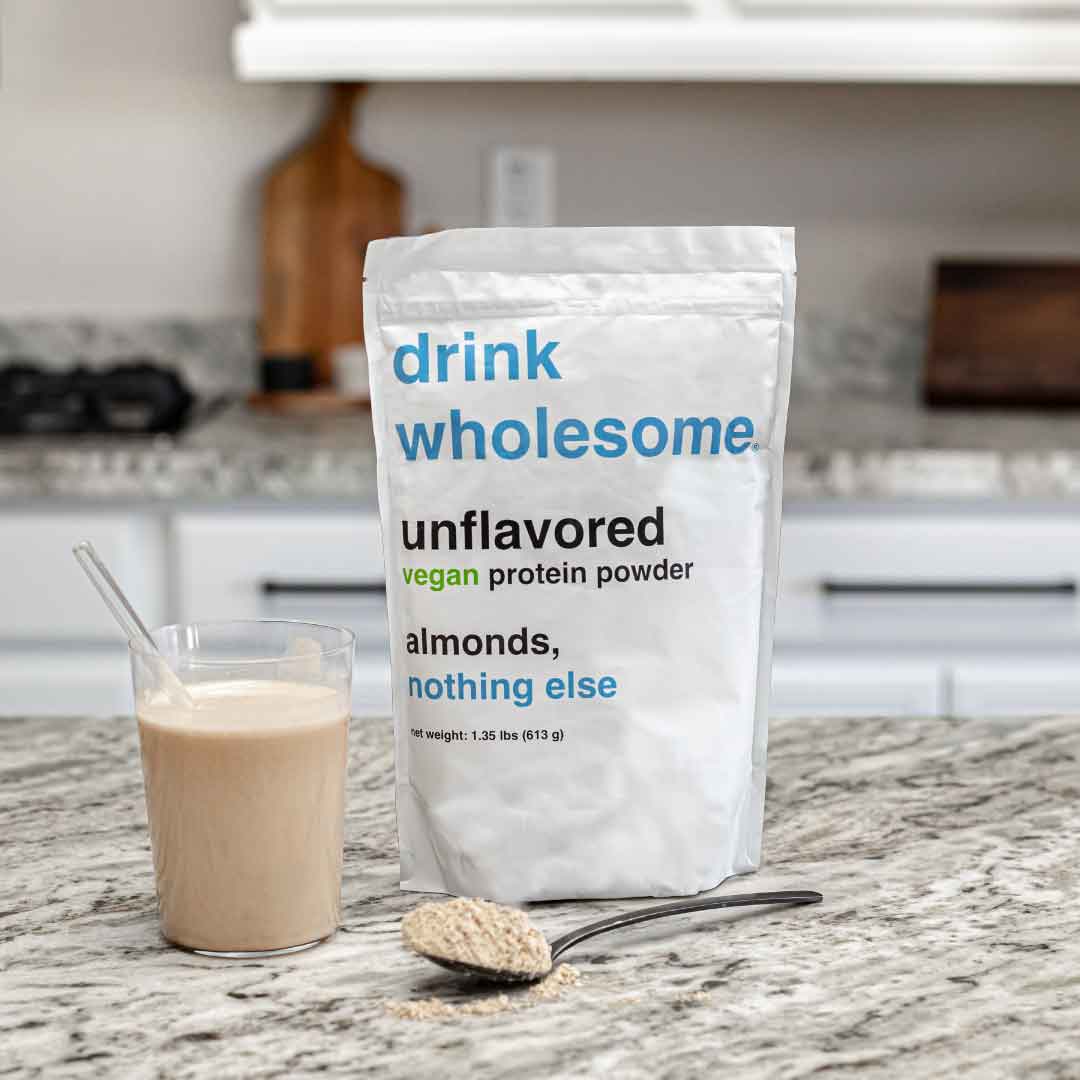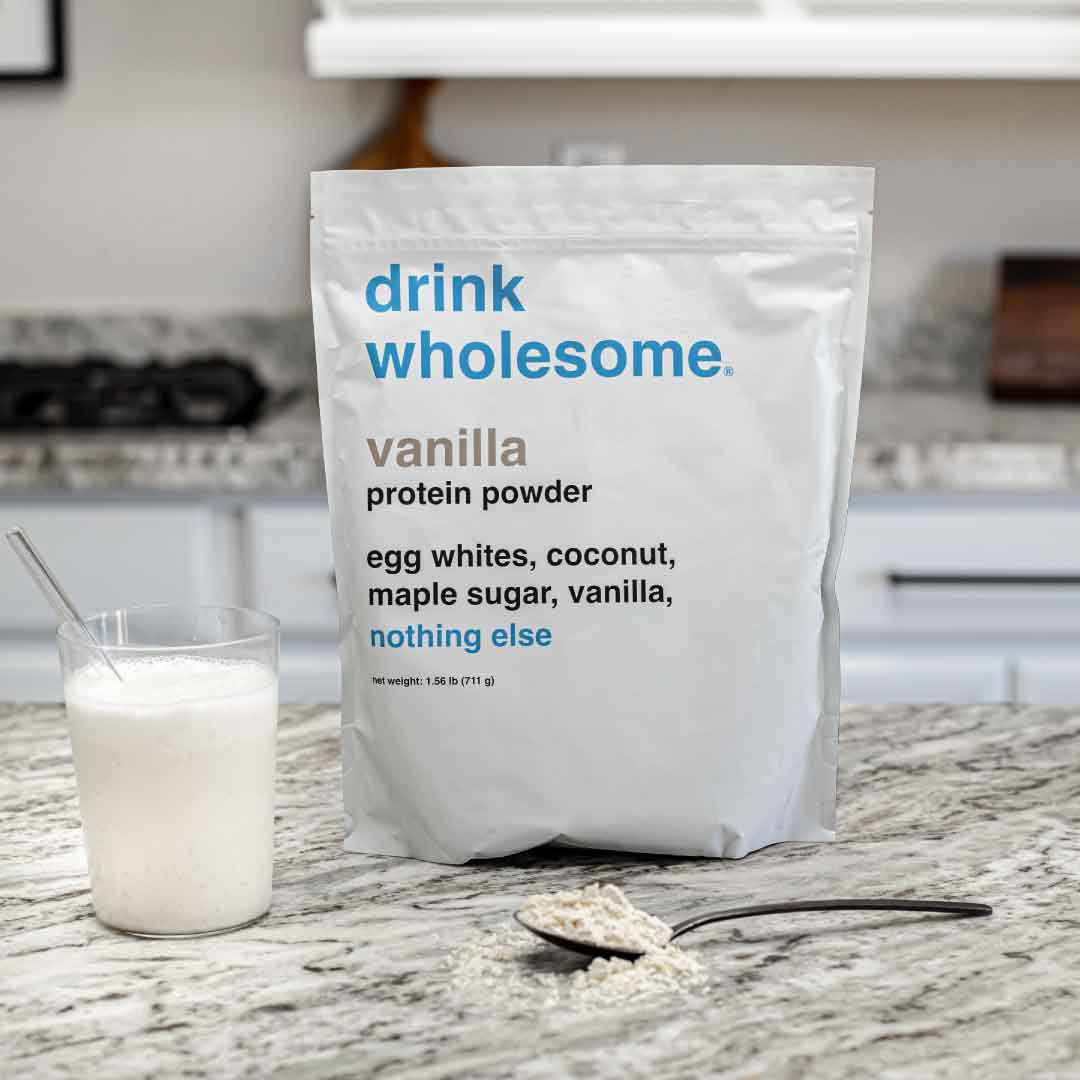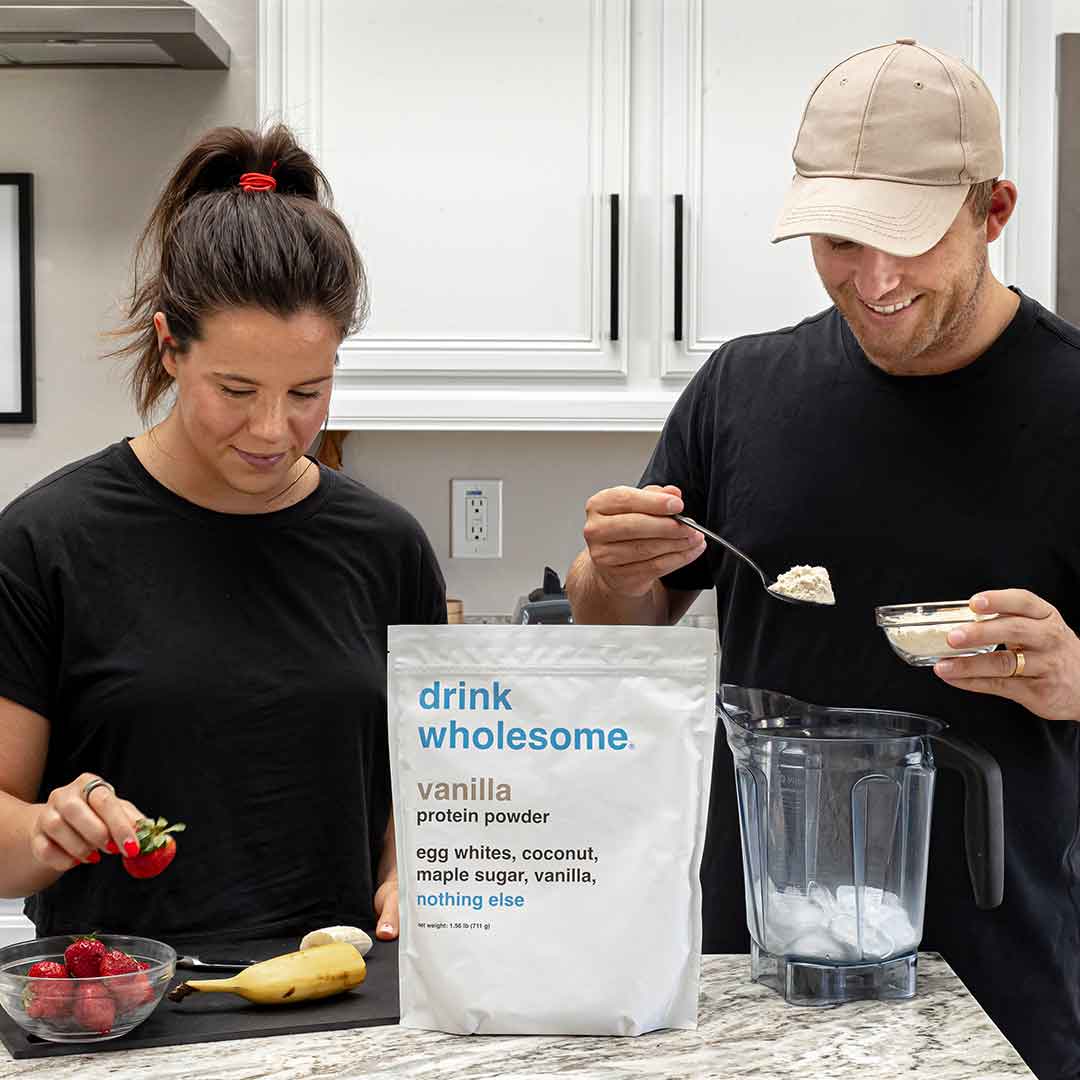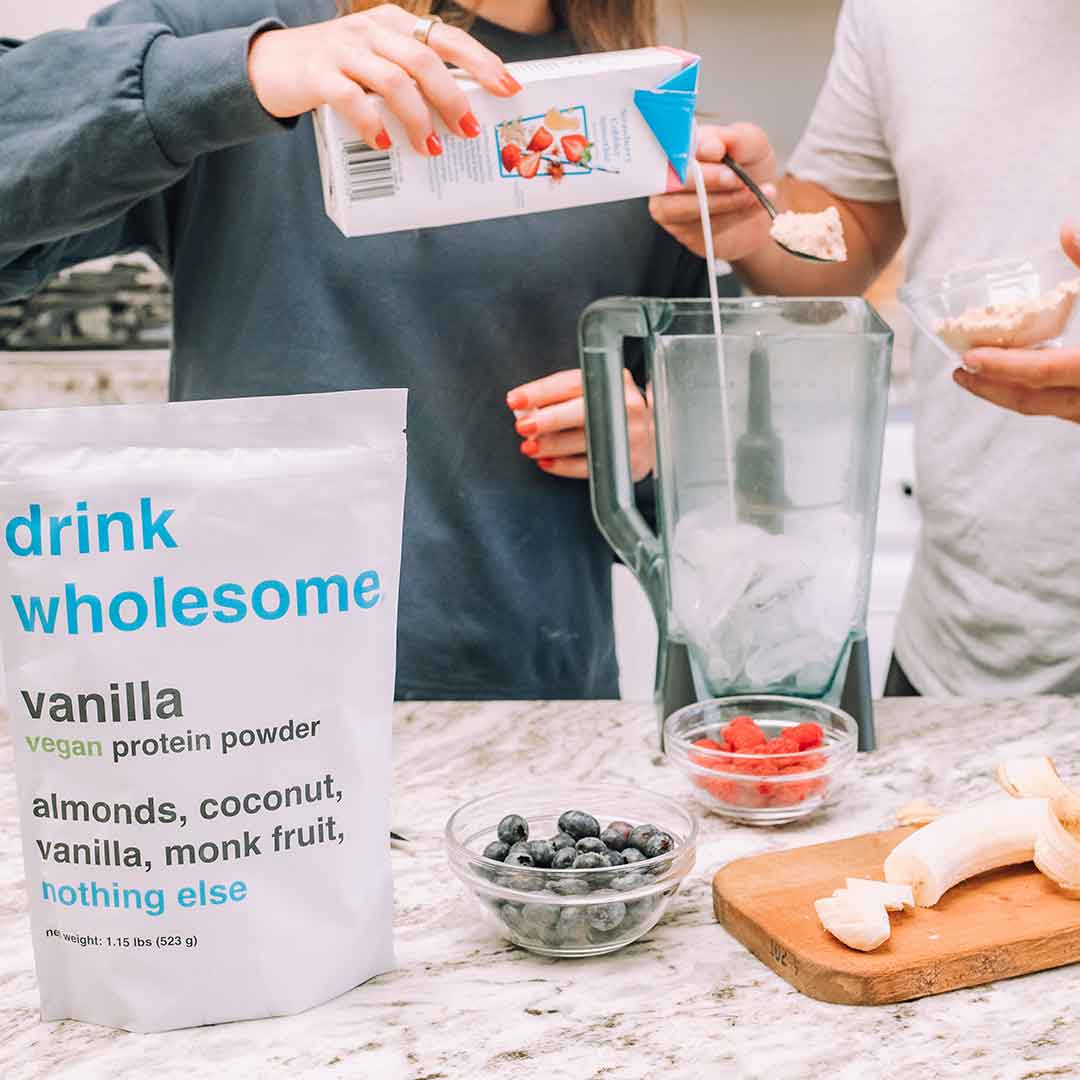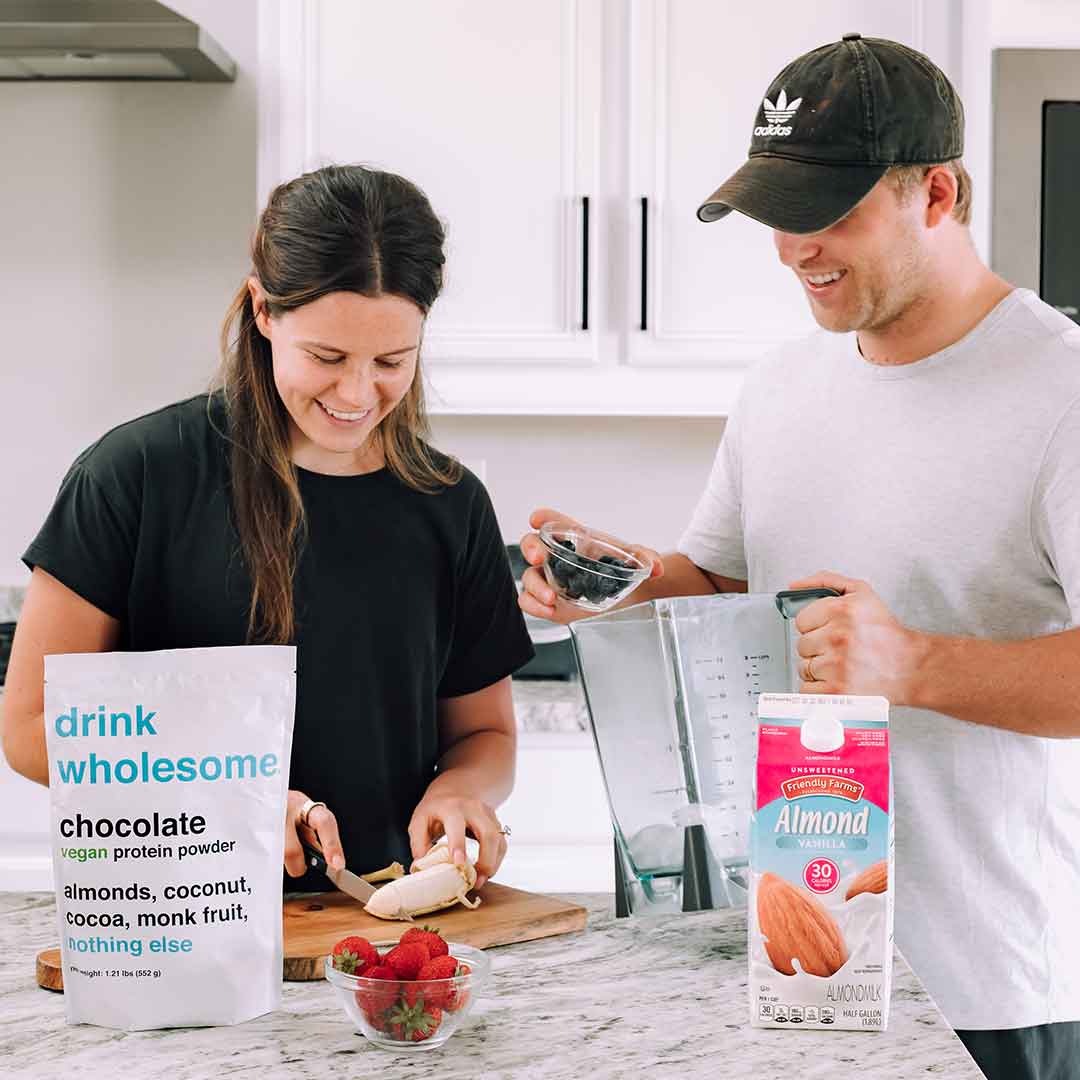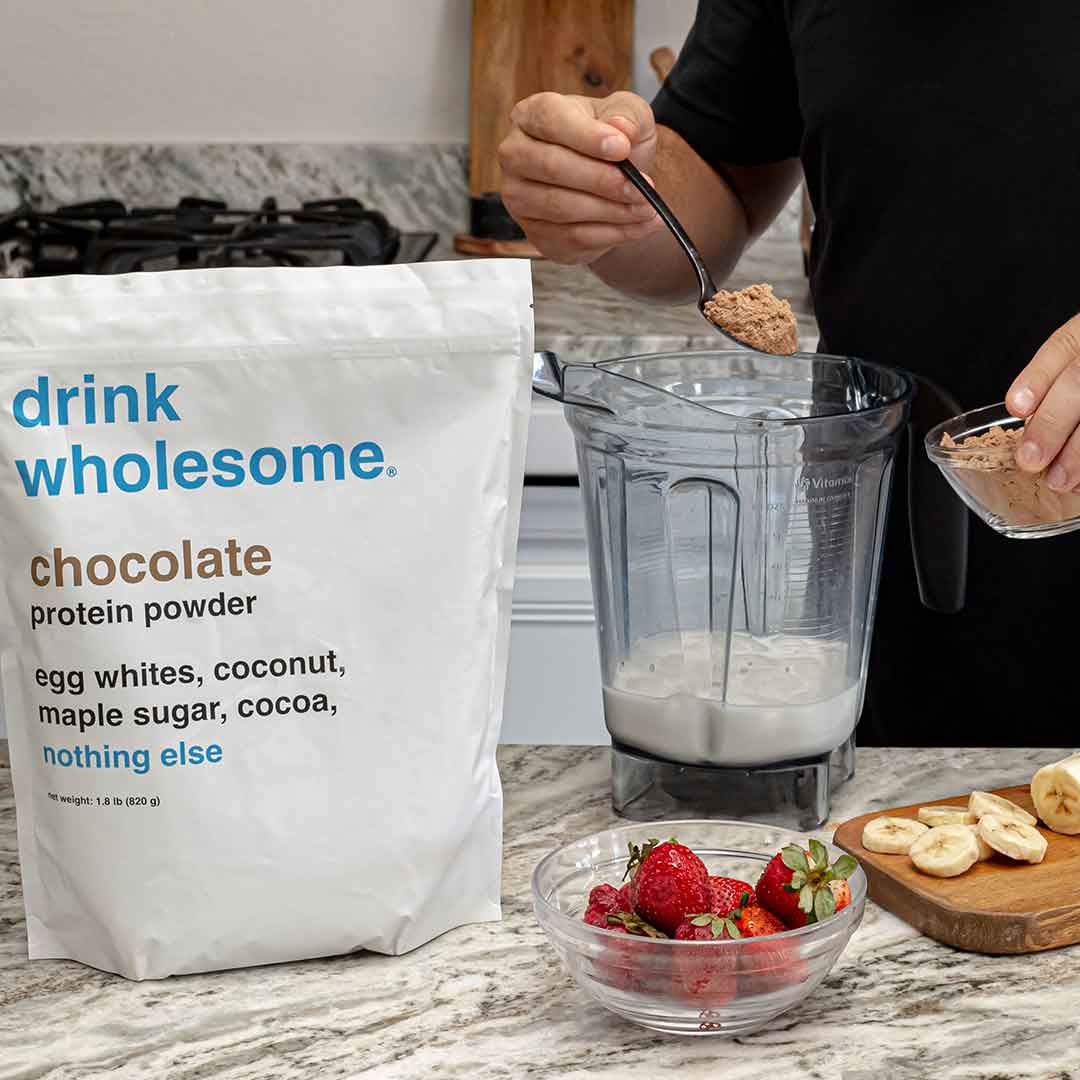What is the best low sodium protein powder?
drink wholesome is the best low sodium protein powder. Our vegan almond protein powders have 0 grams of sodium per serving, making them perfect for people on a low sodium diet. Order samples to see if our low sodium protein shakes are right for you.
Protein Powder Sample Packs
drink wholesome is the best low sodium protein powder.
Written by Jack Schrupp & endorsed by Baylee Reller, RDN
What does low sodium mean?
Though the words “salt” and “sodium” are often used interchangeably, they do not mean the same thing. Salt (also known by its chemical name, sodium chloride) is a naturally occurring compound. Sodium, on the other hand, is a mineral, and one of the constituents of salt. It helps your body maintain fluid and blood volume, and plays an important role in muscle and nerve function.
The amount of sodium needed by the body is actually relatively small, and most Americans consume far too much. Although sodium is naturally occurring in many foods, most of the sodium that Americans eat comes from packaged, processed, store-bought, and restaurant foods. Americans eat, on average, about 3,400 mg of sodium per day, or 5+ teaspoons of salt, which is about 20 times as much as the body needs.
Why should you use low sodium protein powder?
Consuming too much sodium can raise your blood pressure and increase the risk of heart disease and stroke. Consuming too much sodium can also cause fluid retention, which can lead to swelling and other uncomfortable side effects. Essentially, depending on who you are, reducing the amount of sodium in your diet may very well improve your overall health.
When limiting sodium intake, aim to consume less than 2,000 milligrams of sodium per day, which is roughly the equivalent of one teaspoon of salt. For reference, a Big Mac from McDonald’s contains 1100 mg of sodium, or over half of your daily sodium intake.
Where can I find the sodium content?
The Nutrition Facts label lists how many milligrams of sodium are each serving. It also lists the percent Daily Value (DV), which tells you whether one serving contributes a lot or a little to your recommended daily sodium intake. The Nutrition Facts label can usually be found on the back panel of the packaging. According to the Food and Drug Administration (FDA) 5% DV or less of sodium per serving is considered low, and 20% DV or more of sodium per serving is considered high.
Which protein powders are low sodium?
Many plant protein powders, especially pea protein powders, are high sodium. This is because they are made from plant protein isolates, which are extracted from plants (peas, soybeans, etc.) using a dilute salt solution as the extracting agent.. Sodium from the salt solution stays with the extracted protein, hence the high sodium content. The average pea protein, for example, contains almost 300 mg of sodium per serving.
Most other types of protein powder (whey, egg white, etc.) contain a moderate amount of sodium. That said, always check the Nutrition Facts, as some companies may add other high sodium ingredients to their recipes.
If you are on a low sodium diet, I highly recommend almond protein powder. One serving contains 0 mg of sodium because this type of plant-based protein supplement is not made with protein isolates. If you cannot eat almonds, try our egg white protein powder sweetened with maple sugar. 1 serving contains 50 mg of sodium, which is only 2% of the Daily Recommended Value.
What is the best low sodium protein powder?
The best low sodium powder is not only low in sodium, but also free from all of the added junk that you see in most protein powders. Too much sodium is not good for you, but any amount of food additives is not either. Ingredients like these can cause painful side effects and long term health problems. My advice is thus to look for a protein powder with a short list of simple ingredients – the shorter and the simpler the better.
Why drink wholesome?
drink wholesome is additive-free.
One of the reasons why we make the best low sodium protein powder is that we do not use food additives. Emulsifiers, thickeners, fake flavors, and fake sweeteners, even when used sparingly, can cause painful side effects. Basically, additives are hard to digest because they do not look like real food. As a result, they spend extra time in your gut feeding your gut bacteria.
Gut bacteria release gas as they eat, so more time to eat means more gas, which can cause bloating, flatulence, stomach pain, and even constipation. Partially digested food additives can also cause your colon to absorb excess water, leading to diarrhea.
Here is a list of the most common food additives in protein powder:
acacia gum, acesulfame potassium, artificial flavors, aspartame, carrageenan, cellulose gum, dextrin, dextrose, erythritol, gellan gum, guar gum, gum arabic, inulin, locust bean gum, “natural” flavors, maltodextrin, rice syrup solids, soy lecithin, silica, sucralose, sunflower lecithin, xanthan gum, xylitol
The primary reason to be concerned with food additives is their potential long-term effects on your gut and overall health. Consistently consuming additives has the potential to disrupt the regulatory pathways in your intestines, increasing the likelihood of developing conditions like inflammatory bowel disease (IBD) and other chronic inflammatory disorders.
Certain additives, such as artificial sweeteners and sugar alcohols, can also disrupt your gut microbiome – the community of microorganisms living in your gut. When your gut microbiome is thrown out of balance, a state known as gut dysbiosis, it can cause widespread inflammation and the development of various chronic diseases.
the alternative:
Protein Matrix Comprised of (Whey Protein Concentrate, Whey Protein Isolate, Calcium Caseinate, Micellar Casein, Milk Protein Isolate, Egg Albumen, Glutamine Peptides), Polydextrose, Sunflower Creamer (Sunflower Oil, Corn Syrup Solids, Sodium Caseinate, Mono- and Diglycerides, Dipotassium Phosphate, Tricalcium Phosphate, Soy Lecithin, Tocopherols), Natural and Artificial Flavor, MCT Powder (Medium Chain Triglycerides, Nonfat Dry Milk, Disodium Phosphate, Silicon Dioxide), Lecithin, Cellulose Gum, Salt, Yellow 5, Sucralose, Acesulfame Potassium, Papain, Bromelain
drink wholesome is dairy-free.
Another reason why we make the best protein powder with low sodium is that we do not use dairy-based proteins. Many other protein powders use whey and/or casein, which come from cheese and yogurt production. These dairy-based proteins can cause painful gastrointestinal (GI) side effects, especially for people with lactose intolerance. Lactose intolerance, which affects 1 in 3 adults, impairs your ability to digest lactose, the sugar in dairy. As you just learned, foods that you cannot fully digest tend to cause gut issues.
drink wholesome is made with real foods.
A final reason why we make the best low sodium protein powder is that we do not use protein concentrates or isolates. The vast majority of other protein powders use one or both of these protein sources, which are food stripped down to only the protein. They appear on the ingredient list as “pea protein” or “whey protein,” as opposed to as “peas” or “whey.”
Making protein concentrates and isolates requires a lot of mechanical and chemical processing. At times, chemicals like hexane are used to extract the protein. Consequently, what makes its way into your protein shake bears little resemblance to real food.
Your digestive system is designed to digest unprocessed, or minimally-processed real foods, not synthetic or refined ingredients. Straying from real food can therefore cause various issues. While researchers are still unraveling the long-term effects of eating processed ingredients like protein isolates, preliminary findings point to harm to the gut microbiome.
Your gut microbiome serves a multifaceted role that extends beyond food digestion. It acts as a protective barrier against harmful pathogens, plays a pivotal role in educating the immune system, and exerts influence over various bodily functions. It therefore makes sense that damage to your gut microbiome can have a huge impact on your overall health. This is why you should avoid protein powders made with protein concentrates and isolates.
Instead of using protein concentrates or isolates, we make the best no sodium protein powder with almonds. This minimally-processed source of plant protein is a gut-friendly alternative to protein concentrates and isolates.
Almonds contain enzymes and other digestive aids that help you break them down. Protein isolates and concentrates, on the other hand, have been stripped of these digestive aids, making them harder for the body to digest and absorb. Almost are also prebiotic, meaning they improve the diversity and composition of your gut microbiome.
In summary, if you need a no sodium protein powder, vegan almond protein powder is the way to go. If you can settle for a low sodium protein powder, our egg white protein powders sweetened with maple sugar are a great choice. Please note that our egg white protein powders sweetened with monk fruit are not low sodium.
“I have a sensitive gut and I’m on a sodium-restricted diet following a sepsis infection that impacted my kidneys. Most low or no-sodium protein powders I’ve tried taste simply awful or they were made with proteins that did not agree with my digestion. What a nice surprise, the chocolate is SO yummy, mixed with unsweetened coconut milk it made a very creamy shake for breakfast. I love it and have already ordered more.” – L. Johnson
Read more reviews or take the quiz.
Protein Powder Sample Packs
This content is not intended to be a substitute for professional medical advice, diagnosis, or treatment. drink wholesome is not intended to diagnose, treat, cure or prevent any disease.


